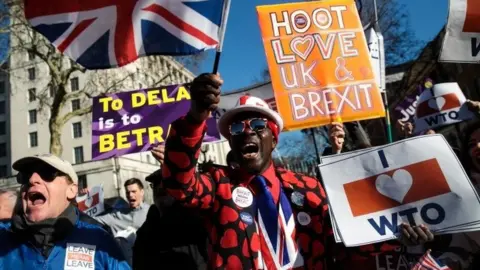Brexiteer MPs say delay would be political calamity
 Getty Images
Getty ImagesTwo leading Brexiteers have said any delay to Brexit would do "incalculable" harm to public trust in politics.
Writing in the Sunday Telegraph, Tory MP Steve Baker and the DUP's Nigel Dodds said the "extended uncertainty" would be a "political calamity".
On Tuesday, Theresa May will again ask MPs to back her Brexit deal, but if they reject it they may get a chance to vote to delay Brexit.
The UK is due to leave the EU on 29 March.
Mr Baker, who is deputy chairman of the pro-Brexit Tory European Research Group (ERG), and Mr Dodds wrote that, for some, any delay would mean "democracy would be effectively dead".
They said that such an outcome would be "a costly delay for businesses which have prepared to exit on 29 March".
Both were confident that without changes to the deal, Mrs May would be "defeated firmly" again on Tuesday.
MPs rejected the prime minister's deal by 230 votes in January - the largest defeat for a sitting government in history.
If they do the same this week, MPs have been promised a vote on whether the UK should leave without a deal.
If they then reject a no-deal Brexit they could get a vote on Thursday on whether to request a delay to Brexit from the EU.
Speaking on Sky News, Shadow Brexit Secretary Sir Keir Starmer said: "A delay or extension of about three months is probably doable. Beyond that it becomes much more difficult."
He added that Labour's front bench would not put down an amendment to secure another referendum, ahead of the vote on Mrs May's deal on Tuesday. He said any such amendment should come from a backbencher in order to get more widespread support from MPs.
Health Secretary Matt Hancock told the same programme it was not inevitable that the withdrawal deal negotiated with the EU would be rejected on Tuesday.
He added: "It's in the gift of MPs to get on and deliver on Brexit and I very much hope that that is what people will vote for."
Since January, the prime minister has been trying to seek assurances from the EU about the so-called Irish backstop - an aspect of her plan which is a sticking point for many MPs.
If Parliament approves Mrs May's withdrawal agreement, and the UK leaves the EU on 29 March, it will begin a transition period, when the two sides will attempt to agree a comprehensive trade deal.
If a trade deal is not agreed by the end of the transition period, the backstop is designed to maintain an open border on the island of Ireland.
It would keep the UK in a "single customs territory" with the EU, and leave Northern Ireland in the EU's single market for goods.
But some MPs fear that - in its current form - the backstop may leave the UK tied to the EU indefinitely.
They want Mrs May to change this aspect of the deal.
Discussions between the UK government and EU officials on how to resolve the problem continued over the weekend.
On Friday, Mrs May said the UK had put forward "serious" proposals to resolve the deadlock.
The EU said it was prepared to include a number of existing commitments relating to the application of the backstop in a legally-binding document.
Its Brexit negotiator Michel Barnier tweeted that the UK "will not be forced into [a] customs union against its will" as it could choose to exit the proposed "single customs territory" on its own. But Northern Ireland would remain part of the EU's customs territory, subject to many of its rules and regulations - something the government has previously said would threaten the constitutional integrity of the UK.
Brexit Secretary Steve Barclay and the DUP, the party Mrs May's government relies on for a majority in Parliament, were both dismissive of the EU's latest proposal.



Meanwhile the US Ambassador to the UK, Woody Johnson, has urged the British public not to let the "distraction" of the debate over food standards and chlorine-washed chicken block the "huge opportunity" of a trade deal between the countries.
He said the US was the world's largest food importer, but currently bought less than one per cent of its food from the UK.
Writing in the Mail on Sunday, he said: "It's time to move on from chlorinated chicken. It's just a bogeyman used to scare you out of doing a great trade deal with America that will give your businesses a huge competitive advantage."
